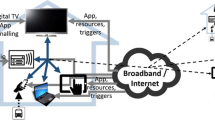Abstract
Currently information on the web is accessed through different devices. Each device has its own properties such as resolution, size, and capabilities to display information in different format and so on. This calls for adaptation of information presentation for such platforms. This paper proposes content-optimized and time-optimized algorithms for information presentation adaptation for different devices based on its hierarchical model. The model is formalized in order to experiment with different algorithms.
Access this chapter
Tax calculation will be finalised at checkout
Purchases are for personal use only
Preview
Unable to display preview. Download preview PDF.
Similar content being viewed by others
References
Cui, G., Sun, D., et al.: WebUnify: An Ontology-based Web Site Organization and Publication Platform for Device Adaptation. In: Proceedings of SNPD 2004 International Conference (July 2004)
Dolog, P., Nejdl, W.: Semantic Web Technologies for the Adaptive Web. In: Brusilovsky, P., Kobsa, A., Nejdl, W. (eds.) The Adaptive Web: Methods and Strategies for Web Personalization, pp. 697–719. Springer, Heidelberg (2007)
Dolog, P., Nejdl, W.: Using UML and XMI for Generating Adaptive Navigation Sequences in Web Based Systems. In: Stevens, P., Whittle, J., Booch, G. (eds.) UML 2003. LNCS, vol. 2863, pp. 205–219. Springer, Heidelberg (2003)
Er-Jongmanee, T.: XML-Driven Device Independent User Interface–build Rich Client Applications Using XML. Master thesis, Lehrstuhl für Informatik V (2005)
Ku, T., Park, D., Moon, K.: Device Independent Authoring Language. In: Fourth Annual ACIS International Conference on Computer and Information Science, pp. 508–512 (2005)
Lewis, D., Conlan, O., et al.: Managing Adaptive Pervasive Computing using Knowledge-based Service Integration and Rule-based Behavior. In: Proceedings of IFIP/IEEE Network Operations and Management Systems, Seoul, Korea (April 2004)
Luo, C., Pan, R., Wang, S.: A Hierarchical Model for Auto-adjusting of Information Issuance. International Journal of Computer Science and Network Security, IJCSNS (December 2006)
Ma, W., Bedner, I., Chang, G., et al.: Framework for adaptive content delivery in heterogeneous network environments. In: Proceedings of Multimedia Computing and Networking, San Jose (January 2000)
Pan, R.: The PLCH Binary Tree Model of the Auto-adaptation of Web Information Issuance. Journal of Computer Applications (May 2005)
Pan, R.: A Mathematical Model for the Hierarchization of Web Information and Its Second-Best Algorithm. Computer Engineering and Science (October 2005)
Pan, R., Wei, H., Wang, S., Luo, C.: Auto-adaptation of Web Content: Model and Algorithm. In: ICWMMN 2008, Beijing, China, October 12-15, 2008, pp. 507–511 (2008)
Pemberton, S., et al. (eds.): XHTML 1.0 Specification, W3C Recommendation (August 2002), http://www.w3.org/TR/xhtml1/
Mika, P.: Ontologies are us: A unified model of social networks and semantics. Web Semantics: Science, Services and Agents on the World Wide Web 5(1), 5–15 (2007)
Phanouriou, C.: UIML: A Device-Independent User Interface Markup Language, PhD thesis, Virginia Polytechnic Institute and State University (2000)
Wang, L., Sajeev, A.S.M.: Abstract Interface Specification Languages for Device Independent Interface Design: Classification, Analysis and Challenges. In: Proceedings of First International Symposium on Pervasive Computing and Applications, Xinjiang, China, August, pp. 241–246. IEEE Press, Los Alamitos
Author information
Authors and Affiliations
Editor information
Editors and Affiliations
Rights and permissions
Copyright information
© 2010 Springer-Verlag Berlin Heidelberg
About this paper
Cite this paper
Pan, R., Dolog, P. (2010). Time Optimized Algorithm for Web Document Presentation Adaptation. In: Dicheva, D., Dochev, D. (eds) Artificial Intelligence: Methodology, Systems, and Applications. AIMSA 2010. Lecture Notes in Computer Science(), vol 6304. Springer, Berlin, Heidelberg. https://doi.org/10.1007/978-3-642-15431-7_9
Download citation
DOI: https://doi.org/10.1007/978-3-642-15431-7_9
Publisher Name: Springer, Berlin, Heidelberg
Print ISBN: 978-3-642-15430-0
Online ISBN: 978-3-642-15431-7
eBook Packages: Computer ScienceComputer Science (R0)




